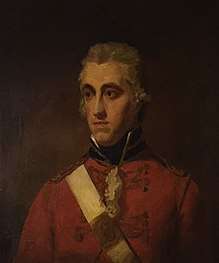Ambrose Hardinge Giffard
Sir Ambrose Hardinge Giffard (1771–1827) was chief justice of British Ceylon.
Sir Ambrose Hardinge Giffard | |
|---|---|
 | |
| 4th Chief Justice of Ceylon | |
| In office 8 April 1819 – 2 March 1827 | |
| Preceded by | Alexander Johnston |
| Succeeded by | Richard Ottley |
| 5th Advocate Fiscal of Ceylon | |
| In office 26 February 1811 – 1821 | |
| Preceded by | William Coke |
| Succeeded by | Henry Mathews |
| Personal details | |
| Born | 1771 Dublin, Ireland |
| Died | 20 April 1827 |
| Alma mater | Trinity College, Dublin |
Life
Giffard was born in Dublin in 1771, the eldest son of John Giffard (1745–1819), high sheriff of Dublin in 1794, accountant-general of customs in Dublin, and a prominent loyalist. His mother was Sarah, daughter of William Norton, esq., of Ballynaclash, co. Wexford. Giffard's grandfather was John Giffard of Torrington, Devon, who gave crucial evidence in the famous Annesley trial of 1743, evidence that turned the scales dramatically in favour of the claimant, James Annesley. Ambrose Hardinge was an attorney engaged in the case by James Annesley's patron Daniel Mackercher. These two names, Mackercher and Hardinge, recurred in the career of John's son, John, and their kindness to the son sprang from the great esteem in which they held his father - esteem that was reciprocated by John junior when he christened his eldest son Ambrose Hardinge Giffard.
After studying for the law he was called to the bar of the Inner Temple, and was appointed chief justice of Ceylon in April 1819. Giffard's health failed, and he was granted leave of absence, but he died on 30 April 1827, while on the homeward voyage, in the Lady Kennaway, East Indiaman. Before his death a knighthood was conferred upon Giffard, but the title was never gazetted.
Works
Giffard's leisure was devoted to literature, and a selection of poems was published at Ceylon about 1822. Some are reproduced in the Traditions and Recollections of Richard Polwhele.
Family
He married in 1808 Harriet, daughter of Lovell Pennell, esq., of Lyme Regis, and left five sons and five daughters. Admiral Sir George Giffard (1815–1888) was his third son.[1]
References
- . Dictionary of National Biography. London: Smith, Elder & Co. 1885–1900.
Further reading
- Gentleman's Magazine 1827
- Burke's Peerage, s. v. 'Halsbury.'
- Attribution
![]()
| Legal offices | ||
|---|---|---|
| Preceded by Alexander Johnston |
Chief Justice of Ceylon 1819–1827 |
Succeeded by Richard Ottley |
| Preceded by William Coke |
Advocate Fiscal of Ceylon 1811–1821 |
Succeeded by Henry Mathews |
